#‘the villain is an especially vital part of the story and can determine the course of the entire arc of some well’
Note
the reason that thanos is a dumb villian is because kang/he who remains wrote his entire life out and made him do all those things, which i think is funny.
Episode 6 should’ve been Loki giving Kang a masterclass on storytelling
#the Loki show#‘the villain is an especially vital part of the story and can determine the course of the entire arc of some well’#‘so if I decided Thanos is trying to save the world by killing half the universe—‘#‘no.’
59 notes
·
View notes
Text
Star Trek: The Characters
Storytelling, especially where it regards movies and television, is always evolving.
Whether it’s in deeper themes, better effects, different genres, or evolving archetypes, there is always something that is changing, except, perhaps, where the importance of characters are concerned.
Characters are an integral part of storytelling, particularly where it concerns television. When it comes to television, the setup is everything, and the characters are part of that setup, that ‘home base’ that the audience returns to at the start of every episode. The characters are the people that the audience gets to know, who star in each adventure. Characters are what holds the audience’s investment, the reason fanbases tolerate bad episodes and praise good ones. In the end, the main characters keep an audience’s attention, making each episode, even the bad ones, enjoyable.
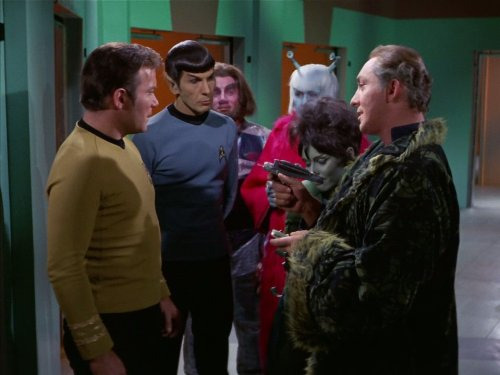
In short, characters can make or break a television show. It is vital that they be likable, or at the very least, interesting, lest the audience utter those eight deadly words:
I Don’t Care What Happens To These People.
Once those words are uttered, it doesn’t matter how gripping your narratives are. The viewers will start to leave.
See, while a film can get away with some lesser characters by distracting with an interesting concept, set-piece or a fast-paced story, television can’t. Thanks to a smaller runtime and a smaller budget, television, by necessity, tends to be character based. As a result, the main cast of a television show has to be able to work in multiple stories of different kinds.
This means that writing for characters on television can be pretty difficult.
The best television characters tend to merge two ideas together: That of relatability and entertainment value.
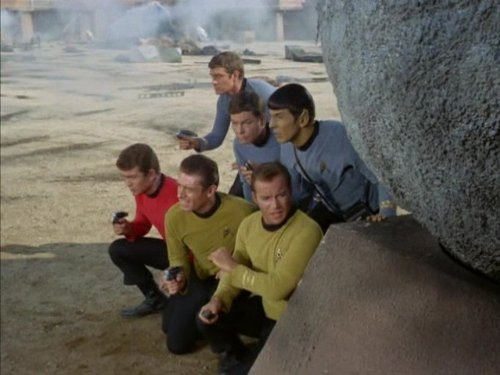
You see, television, like all stories, tells stories of exaggerated versions of reality, especially in the cases of science-fiction adventure shows like Star Trek. The only way to make an audience buy an unbelievable world is to create believable characters to place in that world, that relatability in the stories and characters. When we see McCoy’s frustration, or Kirk’s boldness, or Spock’s reservedness, we see elements of ourselves, our own personalities and lives. It is vital to make characters seem real, if not realistic.
The question is, does Star Trek manage to do that?
That’s the question we’re going to be answering today. Let’s take a look, starting with the Captain of the Enterprise Crew: James Tiberius Kirk.
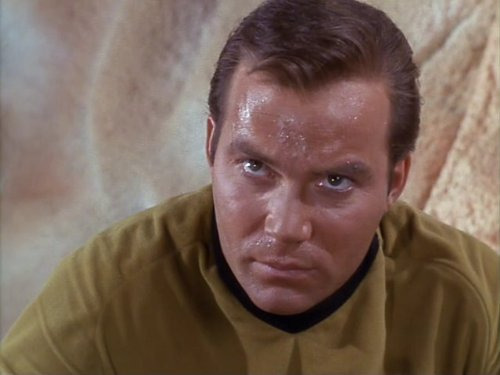
Kirk truly was The Captain in every sense of the word. A Reasonable Authority Figure who did far more adventuring than realistic counterparts would have, Kirk was an Action Man, level-headed, dutiful, and always loyal to his ship and his crew. A Bold Explorer (it’s in the job description), Kirk, while not fearless per say, took the Chains of Commanding quite seriously, and would often face down hugely powerful beings, power-mad computers, or other forces beyond him in order to save his crew. A Determinator to the last, known for his interesting ways to think outside the box and refusal to accept a ‘no win scenario’, he is the unquestionable Hero of the show, the Leader, who often throws the rules aside to do what he feels is right, in a constant battle To Be Lawful or Good. He was a Charmer, an expert fast-talker, and very smart. In later installations of the franchise, Kirk would become a Living Legend, much as he became in our own pop culture.
All that being said, the common cultural image of Captain Kirk isn’t quite right. Allow me to adjust it, as best I can.
More than any other character in Star Trek, or perhaps the history of television in general, Captain Kirk is possibly the most misrepresented character of all time. Since the ‘60s, Kirk has evolved into an icon of heroism, machismo, and brash boldness, with even the recent Star Trek reboot depicting, not Kirk, but rather, the distorted, separate idea of Kirk in the modern light.
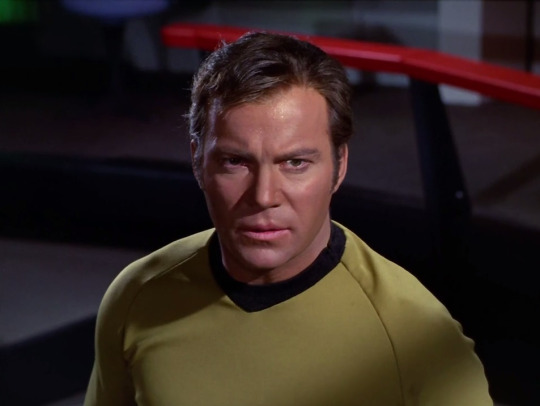
This idea, quite frankly, is just not right. While Kirk did have his share of romances, he was no womanizer, often entering into dubiously consented-to relationships reluctantly, in order to save the ship. The relationships he did actively pursue, he threw himself into wholeheartedly, and he was just as crushed as the other party every time they fell apart (for proof, watch City on the Edge of Forever or The Paradise Syndrome). Kirk was no player. As a matter of fact, he was a deeply compassionate man who respected the women in his life as much as he respected Spock and McCoy. It just so happened that the women in his life tended to not stick around, unlike his one true love: The Enterprise.
Even his reputation of the ‘Cowboy Captain’ isn’t accurate. As I mentioned before, Kirk was defined by compassion. His moments of ‘rule-breaking’ wasn’t to impose ‘the way he thinks things should be’, it’s because Kirk cannot bear to watch helpless people in trouble. The few times where he does break the famous ‘Prime Directive’ (To not interfere with less developed races) is to help. Kirk was a deeply moral character, determined to not stand by while people were taken advantage of. He wasn’t rash, either. While it may be accurate to say that the ship’s doctor, Leonard McCoy, was a bit on the hot-headed side, it is entirely inaccurate to accuse Kirk of the same. Kirk was an extremely smart man, a level-headed captain who was an expert at thinking fast. He trusted his instincts, but he trusted his advisors too, often finding a balance between McCoy’s impulsiveness and Spock’s cold rationality. Kirk’s intelligence and competence is often lost, overshadowed by his more extreme companions, and some audiences have forgotten the truth of Kirk’s character: a cunning problem-solver capable of saving the day under enormous pressure, whose decisions are far from based in irrationality. He is a romantic, duty-bound to protect his ship and crew, greatly exaggerated and mis-characterized in the years following his captaincy.
As such, Kirk was a well-rounded, balanced character, far more three-dimensional than the modern idea of him tends to give him credit for.
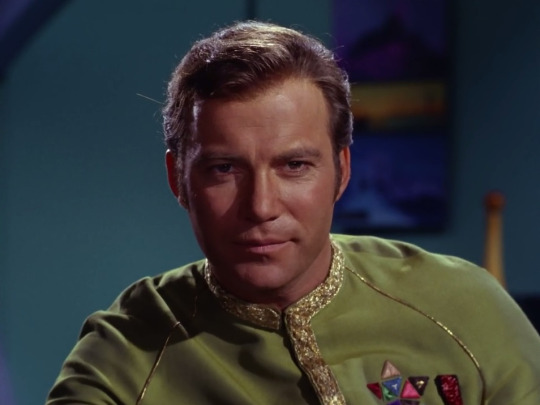
That’s all well and good, sure, but how does he fit as a main character in a television show?
As a matter of fact, absolutely incredibly.
Kirk serves as a wonderfully effective lead, compelling, entertaining, and interesting. Infinitely more developed than most leads of his time, and even more modern examples, Kirk was a game-changer, a revolutionary kind of protagonist who just worked. The perfect balance of the main trio of the series, Kirk is the perfect face for Roddenberry’s ideals: a hopeful pragmatist, an idealist who proves the best of humanity: compassion mixed with intelligence, boldness combined with understanding. A man of action surrounded by True Companions, Kirk was an extremely gripping protagonist who felt intensely, a perfect person for the audience to connect to and be invested in. He drove the stories, opposed the villains, and always saved the crew, as a hero should, but it’s important to note that Kirk was hugely human, possessing many of our greatest attributes, but some of our failings as well. He wasn’t perfect. Sometimes he made the wrong choice. In the end, though, he was us, or us as we should strive to be: always learning and helping, and always reaching for the stars.
But of course, Kirk wasn’t alone in his position as the ‘lead’ of the show. It’s doubtful the show would have survived in the popular culture as well as it did if it weren’t for his support team, his True Companions: Dr. Leonard McCoy, and, more famously: Mr. Spock.
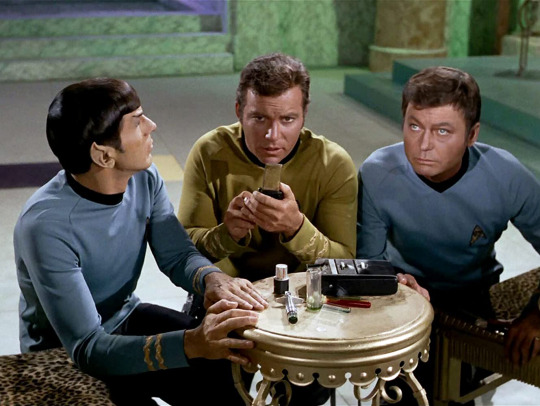
If Kirk represented the best of humanity, Spock represented the critique of it. In a previous article, I pointed out that Spock exists as a very unique character: a half alien, half human crewmember who, while equally valuable to the script and the characters as Kirk was, served a different purpose: to point out and explore humanity from the outside.
Like I’ve mentioned before, Spock is a different sort of character than Kirk is. Where Kirk is a demonstration of the best of humanity as we see it, Spock is a demonstration of humanity as someone else might. He served as a criticism of the human condition, a character at war with himself and his heritage, split between the emotional humans, and the rational Vulcans. Spock is the Number One, almost Comically Serious as he eschews his more illogical half and chooses to embrace the stoicism of the Vulcan people. A Gentleman and a Scholar, Spock has Hidden Depths, a heart of gold and deep emotions that he usually succeeds in hiding.
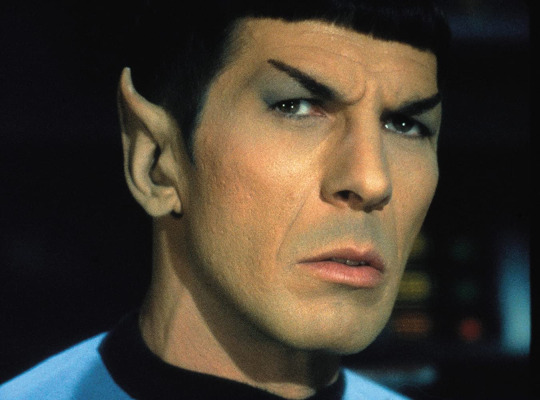
Most of the time. More on that in a minute.
Spock’s role in the show was The Smart Guy, the Stoic who had all the answers, all the statistics. He was the champion of impartial logic, of cold rationality. His job was to give Kirk the hard answers, to bring to him the facts and give him their options, especially the unforgiving ones. He is the cold to McCoy’s hot, a stern-faced, cold-blooded computer.
Or is he?
Much like Kirk, there is a lot more to Spock than meets the eye. While the cultural perception of Spock has often mutated into a parody of itself, much as it has done to Kirk’s reputation, Spock remains a much deeper character than he, or a brief skim of the series, lets on. As I said earlier, Spock is at war with himself, uncomfortable in his own skin. He insults humans for their humanity, but has strong, deep friendships with them. He is not above expressing frustration and their emotional natures when pushed (usually by other forces that knock his guard down), but isn’t frustration a human emotion?
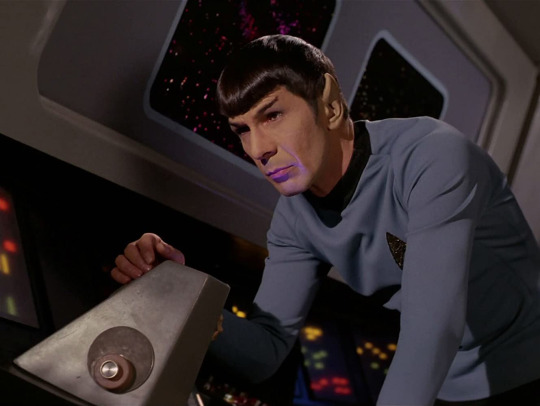
Spock is a bag of contradictions, a supposedly emotionless master of sarcasm, a man without feeling who invites his close friends (emotional humans) to a private Vulcan ceremony, a cold-blooded creature with undying loyalty who occasionally makes ‘illogical’ decisions that would make Kirk proud. A lover of music and a sympathizer to space hippies (Not one of Star Trek’s better episodes, admittedly), Spock was an outsider who fit neither fully as a Vulcan or Human, a person who was struggling to find his place in the universe.
At first, this seems incongruous with the ice-cold exterior he projects, however, rather than being an example of inconsistent writing, it’s a shining example of development and nuance.
You see, Spock never gives up his following of logic. He just begins to approach it differently.
Spock’s style changes slightly as Star Trek progresses (most notably in the films, released ten years after the show’s final season), from cold, ‘computer’ logic to something else: human logic.
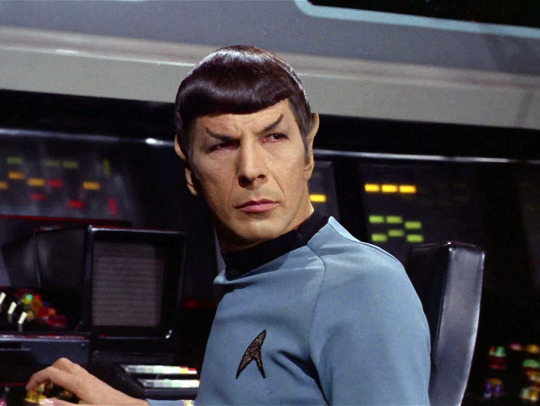
One thing of especial note in the original Star Trek show is that you could see characters visibly affecting one another. Kirk, Spock and McCoy all influenced each other in the ways they thought, reacted, and planned, and worked best as a unit. In this, the humanity of the main cast affected Spock in his slow, reluctant appreciation of human merits. In time, Spock began to make one or two decisions based on human logic, intelligence and emotion. In episodes like The Menagerie or The Galileo Seven, Spock makes decisions that seem out-of-character for him, based in emotion.
Spock is, in many ways, Star Trek’s best known and favorite character. The most visibly recognizable, as well as the most distinct, Spock is given more episodes exploring him than any other character, with installments like Amok Time and Journey to Babel, (the latter of which we explore his parents, and discover why it is that Spock has such a hard time with his human half) helping to examine Spock as a character.
The end result was a beloved science fiction icon, Kirk’s right hand man, an analytical, fascinating character as well-crafted and loved as Kirk himself.
Spock and Kirk are often remembered fondly, and are typically considered the most memorable and iconic characters of the franchise, but they don’t work alone. Their dynamic is as effective as it is because of balance. Spock is one extreme, and Kirk is the middle, but it’s no good without the other extreme: Dr. Leonard Horatio “Bones” McCoy.
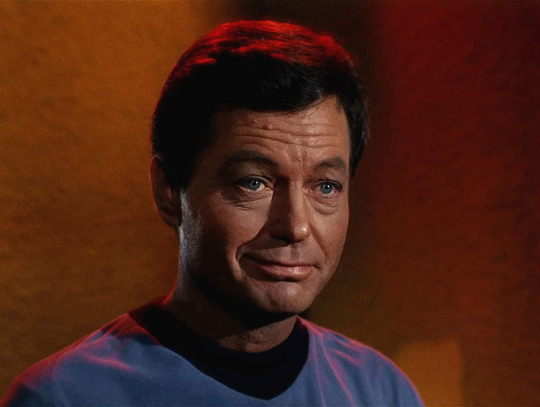
McCoy is all hot-blooded human, the third of the main Power Trio. An old-fashioned competent doctor who wasn’t entirely thrilled with deep space, McCoy is a deeply emotional character, duty-bound to follow his morals. He clashed with Spock regularly, routinely criticizing him for his perceived lack of emotion. Despite the fighting, McCoy respected Spock greatly, counting him as a close friend, despite their arguments and different perspectives. A cantankerous pacifist (though not above getting into the action when needed), McCoy is a Super Doc and a Sarcastic Devotee, a Grumpy Old Man who serves as the Heart to Spock’s Brain (hah!), a man who values Honor Before Reason who values the Good Old Ways. He’s a Determined Doctor who does everything he can for his patients, and a Deadpan Snarker to the point where he can match Spock in verbal sparring.
Bones represents the unpolished rawness of humanity, getting carried away with his emotions sometimes, but always with the best intentions. Another Jerk with a Heart of Gold, McCoy’s gruff nature accompanied a deeply moral man, very concerned with human empathy and doing the right thing. No philosophical discussion was complete without McCoy’s two cents, telling Kirk what he thought the right thing to do was. He was the quintessential Knight in Sour Armor, who would follow Kirk to the ends of the earth, complaining the entire way.
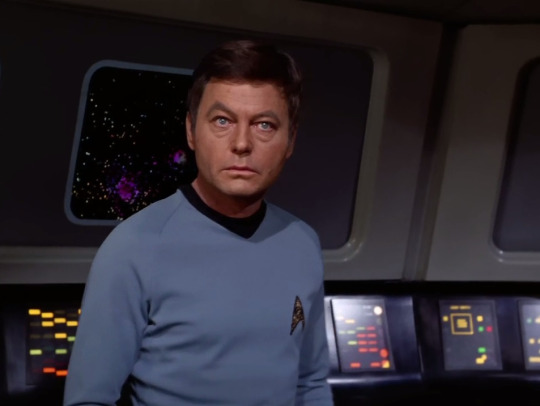
Despite the fact that he’s not as well-known as the other two members of the Power Trio, Bones was a vital component to the True Companions dynamic. His Vitriolic Best Buds relationship with Spock made up one of the most interesting and compelling dynamics on the show, serving as perfect counterbalances to one another. However, although his most famous role in the show was arguing with Spock (and delivering phrases such as ‘He’s Dead, Jim’), there is another, equally important position that he held in the trio.
McCoy served as a foil to Kirk, as well as one to Spock, a confidante, a close friend, providing perspective. While Spock was focused on the logic, Kirk on the best thing for the mission, McCoy’s focus was purely on the ‘patients’, the people, the right thing to do. No matter the situation, McCoy was the closest to empathy with the people involved, and provided the audience with another surrogate, saying the things that the viewers are thinking.
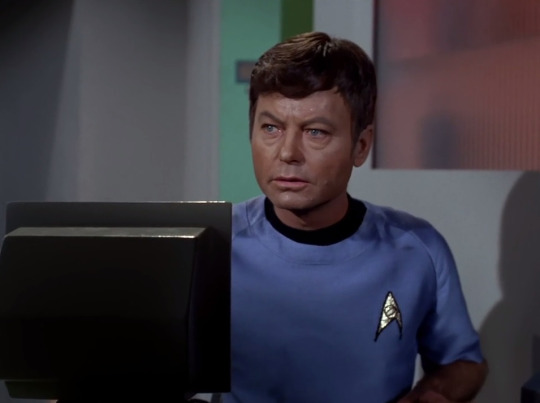
While not being a terribly big fan of space (and liking transporters even less), Bones was the epitome of the Frontier Doctor to the stars, taking care of every patient, even if they weren’t humanoid (Devil in the Dark) or a heavily pregnant woman who refuses to listen (Friday’s Child). McCoy was painfully human, reminding us of our most problematic traits while also holding onto that wild, fiery compassion that made him so incredibly humane, relatable, and understandable, making him just as vital to the Enterprise and her crew as Kirk or Spock.
The trio worked best together, providing a perfect main cast for an audience to follow. The formula was an interesting one, allowing the audience to hear separate viewpoints and ideas, listen in to the philosophical banter, and truly feel the strong friendship holding the leads together. The dynamic between them was powerful, an extremely vibrant bond that connected all three very different characters.
The result? Extremely dynamic characters that remain iconic and memorable even to this day.
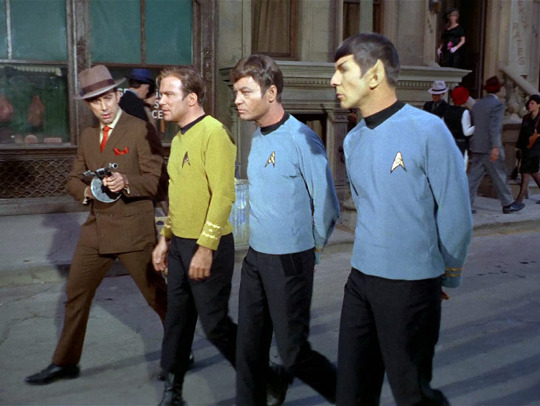
But the cast didn’t stop there.
The other characters of Star Trek, while not quite possessing the pop-culture iconography of the main trio, still hold their own rather impressive cultural footprint.
None more so than the chief engineer, Montgomery Scott.
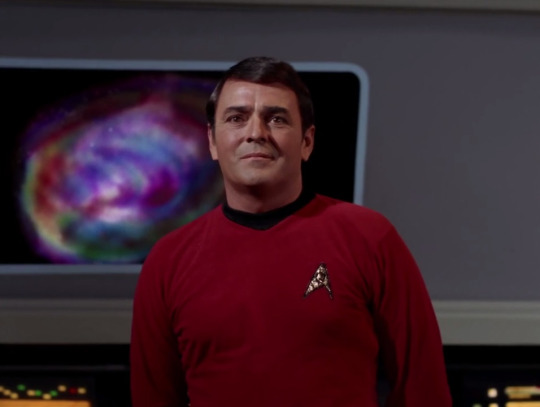
Scotty’s job was to be a miracle worker, solving impossible problems in impossibly small amounts of time. Whether it was the transporters, the phaser banks, the shields, or the engines, Scotty was the man for the job. Nobody had a better understanding, or love for the Enterprise than Scotty (except maybe Kirk). He was the king of outside-the-box solutions, and had the Enterprise jury-rigged to push her past her limits more times than can be easily counted. As the name implies, he was also Scottish, and extremely stereotypically so. Kilt, whiskey, haggis and all, Scotty was extremely proud of his heritage (though not quite as much as Chekov). Fitting the traditional stereotypes, Scotty had a fiery temper, with a Berserk Button triggered by any insult to the Enterprise. A Gadgeteer Genius (and the inventor of Scotty Time) as well as a Genius Bruiser, Scotty was both the brains and brawn, more than capable of holding his own in a fight, or thinking of a new, creative way to push the Enterprise past her capacity.
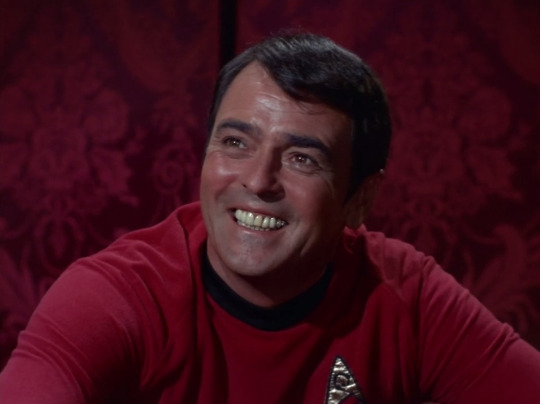
Scotty also held the distinction of being third in command, routinely taking the Captain’s chair when both Kirk and Spock were in the landing party. He was also the focus of a few episodes, making him a rare character with a Day in the Limelight, with episodes such as Wolf in the Fold, The Lights of Zetar, By Any Other Name, and The Trouble with Tribbles giving him a little more screen time and story than is typical. Scotty was an indispensable member of the crew, a life-saver on more than one occasion, and another of the legendary, iconic characters of the original Star Trek.
But it didn’t stop there.
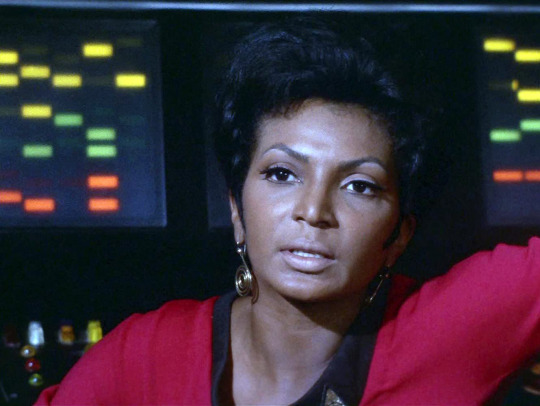
Lieutenant Nyota Uhura was another prominent character. As the ship’s communications officer, she codified the term ‘Bridge Bunny’, although she proved herself far more useful than she’s typically thought of. Whenever given the chance, Uhura is a capable Action Girl, intelligent, witty, and good at her job, being extremely fluent in multiple languages. She too got her days in the limelight, with episodes such as Mirror Mirror, The Gamesters of Triskelion, and The Trouble with Tribbles giving her more to do than just sit at her station and say ‘hailing frequencies open’. Uhura was Silk Hiding Steel, not typically in the heat of the battle, but tough as nails when she had to be. (I’ve talked about Uhura’s extensive influence on the real world in the Legacy article, but even that doesn’t scratch the surface of what Uhura’s impact has been.)
There were others on the bridge crew of equal importance, including the ship’s helmsman, Hikaru Sulu.
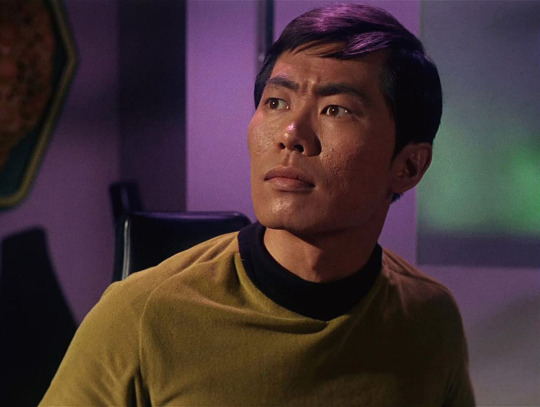
Sulu was a level-headed officer, amiable and cultured, with an extensive knowledge of botany, fencing, and antiques. Yet another Deadpan Snarker (it must run in the cast), Sulu is another Genius Bruiser, as skilled in fighting as he is in his piloting, with a great sense of humor. He is given special attention in episodes like Mirror Mirror and The Naked Time (Albeit as evil, and Brainwashed and Crazy), but often got great character moments in multiple episodes (especially Shore Leave). A reliable officer and loyal to the core, he made an interesting character by himself, although he did end up forming a fun ‘Those Two Guys’ dynamic with the youngest of the cast, Pavel Chekov.
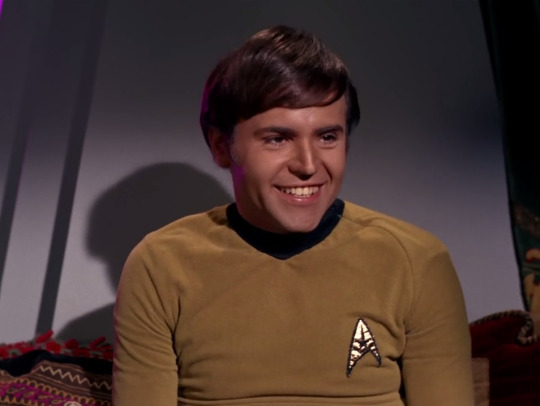
Chekov was introduced in season 2 as the navigator of the Enterprise. A bright young man with a fierce, passionate loyalty to Mother Russia (which evidently invented every good thing known to man), Chekov tended to be at the receiving end of a lot of the embarrassing agony in the series (mostly because Walter Koenig had a great scream). Also serving as a relief science officer, Chekov was plenty smart, if a bit of a Cloudcuckoolander, and the king of Cultural Posturing. Reckless and impulsive to balance Sulu’s calm good humor, Chekov’s temper tended to get the better of him. Like the others, he’s given a bit more screen time in episodes such as Mirror Mirror, The Trouble with Tribbles, The Way to Eden, The Deadly Years and Spectre of the Gun, but got to shine in plenty of other episodes, demonstrating his capabilities (despite being ‘The Intern’ and the Plucky Comic Relief) as a competent officer. Unsurprisingly, he was yet another Deadpan Snarker, lending his style of jokes well to bounce off of Sulu’s drier humor.
But there was more to the crew than the bridge.
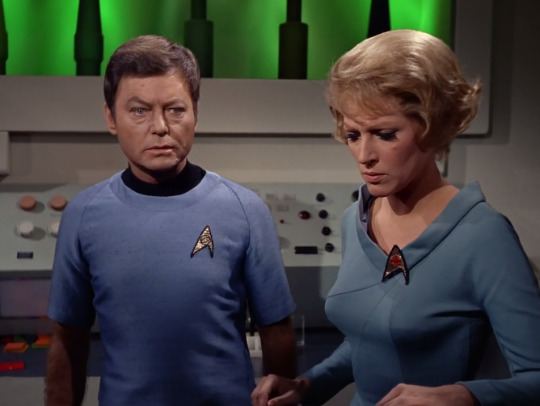
Another crew member of note was Christine Chapel, one of the nurses who operated in the sickbay. Chapel was notable for having an attraction to Spock, as well as being another in the long line of Enterprise Deadpan Snarkers. One of the most caring of the Enterprise’s crew, Chapel was given larger roles in episodes like The Naked Time, What Are Little Girls Made Of?, Amok Time, and Plato’s Stepchildren.
Arguably though, one of the most important characters in all of Star Trek was the Companion Cube: the Enterprise herself.
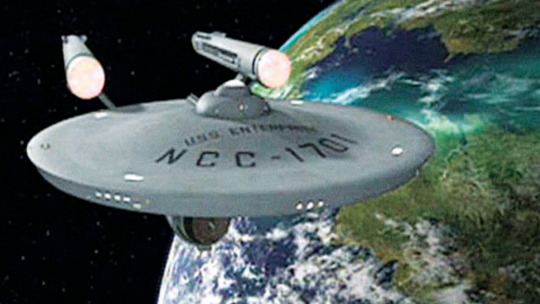
The Enterprise was one of the most powerful ships in Starfleet, a character in her own right. The epitome of the Cool Starship, the Enterprise was well known for Explosive Overclocking, and always coming through in the end (with a little help from Scotty). A Lightning Bruiser of a ship, the Enterprise became as legendary as her captain and crew, as beloved as the characters themselves to the point where one of NASA’s shuttles was named after her.
The characters of Star Trek are legends, both in and out of universe, and they are for a reason. No member of the crew is useless. Everyone has a purpose and a job to do, and each was distinct and unique. No two characters were the same, and each brought their own special personality and abilities to each episode they appeared in.
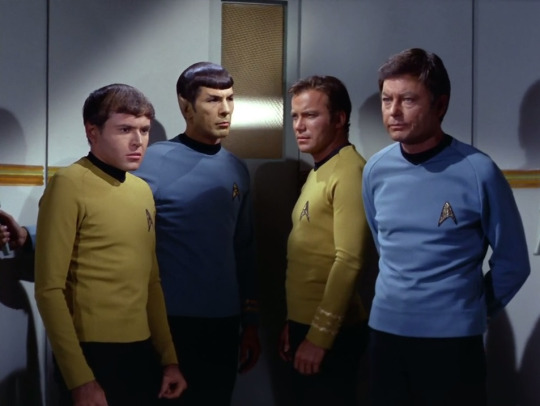
And that’s what made the drama of the show work so well.
Each character felt real, memorable and genuine. We as an audience worry for them with each danger, and cheer with each victory. We liked these people. We cared about what happened to them.
And they worked.
In each scenario and situation, the characters found new and interesting ways to deal with the circumstances, while never losing the core elements of their personalities. That’s important, hugely so. These characters were loved, and still are, for a reason. They work very well as characters, both in main and supporting roles, providing entertaining and compelling figures for the audience to invest in. The balance between relatability and entertainment was hit perfectly for every single character, allowing everyone to shine in their own ways in each episode. They felt real, and in the end, that’s the point of a character.
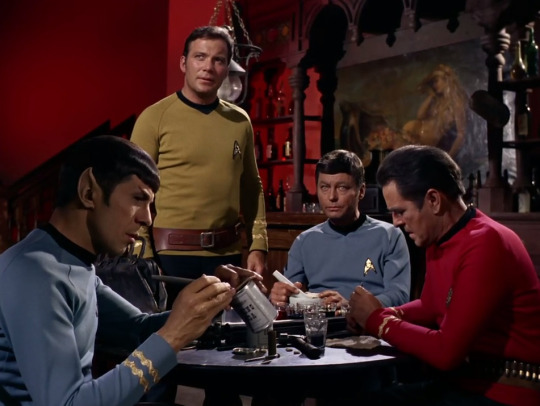
After all, one doesn’t get to be some of the most iconic television characters of all time by being boring.
Thank you guys so much for reading! Join us next time as we discuss Star Trek’s place in the times and the culture. If you have anything you’d like to say, don’t forget to leave an ask! I hope to see you all in the next article.
#Star Trek: The Original Series#Star Trek#TV#Television#TV-PG#60s#Drama#Action#Adventure#Sci-Fi#Science Fiction#William Shatner#Leonard Nimoy#DeForest Kelley#James Doohan#Nichelle Nichols#George Takei#Walter Koenig#Majel Barrett#Gene Roddenberry
133 notes
·
View notes
Note
Since you seem to enjoy analyzing stories I was wondering if you have any advice on what to do when your mind narrows in on critical aspects? I usually really enjoy analyzing media but recently I found that my mind tends to hyper-focus on aspects that I don't like even when I'm actively trying to ignore it and focus on what I do like. So I was just curious if you have tips for dealing with it and/or getting out of this mindset. Thanks and I apologize if this isn't the right blog for this!
Ugh. This is a big question and I’m not sure I’m qualified or immune to complaining. But I consider myself honored, I’ll try my best to answer it.
There’s three things you can do here
a) Try to find out where it’s coming from.
Cross-examine yourself active listening wise. Your reactions can generally come from two places: What you’re actually looking at, or yourself.
Is everything annoying you as of late because you are angry? Are you having a bad week because of something in your private life? Are you sensitive because some larger tendency in RL/society is pissing you off? Is it even anger? What are you feeling and why? Does it really have anything to do with this movie etc?
Or is it something about the work itself? Does it remind you of something that happened to you? Does your displeasure come from a value that is important to you or a pattern that you believe to be a bad influence on society.
Really try to put into words what it is that makes you feel this way while keeping in mind that your feelings, your reaction to the work and the work itself are separate entities.
I’d remain open to the possibility that you have a legitimate gripe here. If you personally can’t enjoy a work either because a subjective factor or an objective flaw that’s a dealbreaker for you, you shouldn’t force yourself to like it because your friends do or because it didn’t do anything “unforgiveable”. Deciding that it’s not your cup of tea needn’t be a moral judgement on everyone who made the work or everyone who likes it.
On the other hand you might find it easier to enjoy it if you acknowledge the flaw and put it into definite words, tell your inner critic that you heard them and then continue. If you try not to think about something you automatically end up thinking about it.
b) Keep in mind that there are many valid stories and that all of them are worth telling
A lot happens on this green earth. Consider the following cases:
A1: A small, lithe person is mistreated by a big strong one
A2: A small, lithe person mistreats a big strong one and pretends to be the victim appealing to their small ness
B1: An eccentric kid is labeled as disordered just for being eccentric and because the teachers don’t want to deal with her
B2: A serious-minded kid has an actual anxiety disorder and experiences stigma because of it and people not understanding that it’s real and debilitating
C1: There is a socially awkward, nerdy character. She is eventually revealed as autistic and her friends accept her just as she is.
C2: There is a socially awkward, nerdy character. She comes out as aroace and all her friends support her. It is emphasized that she is actually as affectionate as everyone else and preconceptions to the contrary were just bigoted misunderstandings.
C3: There is a socially awkward, nerdy character. She finds a significant other who loves her even though she is socially awkward, and her love leads her to discover more communicative passionate sides to her personality.
Clearly, for each of these scenarios, there are going to be people who relate to some but not to others. If you’ve got an anxiety disorder you’re going to relate to the story with the anxiety disorder, and if you were mis-labeled by incompetent teachers you’re gonna relate to that. But both actually happen in real life. B1 is me B2 is one of my sisters. You might even say they’re caused by some of the same intolerant attitudes.
So ask yourself: Is any of these intended as a “fuck you” to the people who would rather have the other ones? If in one particular story the character was mistakenly labeled by incompetent teachers and never had a real disorder, it it saying that no one has real disorders? If the small and lithe character turns out to be the victim, does it mean that big and strong characters are never victims? No of course not.
- You can criticize it if the story outright makes such statements and it is vital to do so (see next paragraph), but if the point in the story is just that this particular character was wrongly labeled, or this particular small character was the victim, then it’s simply telling a different story, not at all making a point about whether real disorders or big strong victims exist.
What’s cathartic or empowering or meaningful to people is as different as people themselves. There’s a good chance that there won’t be an exact match between you or any given authors.
Often the problem is not the stories that are there, but the ones that are missing. It’s not per se bad to have “girl gets rescued by prince” stories, it’s only bad if they’re the ONLY stories. The solution is more stories.
Obviously there are exceptions to that like stuff that outright includes negative stereotypes or unquestioned bad behavior treated as good,
c) Focus on constructivity and context instead of loaded labels
The above was more about perceived flaws this one is about real indisputable flaws. Flaws that are important to point out.
The number one goal here, if you really care about stopping harm and not anyones egos, should be to get people to stop doing it.
Sometimes in extreme cases making someone out to be a bad person and warning of them is exactly how you stop harm, but often time its not and getting obsessed with “punishing bad people” while losing sight of “preventing harm” does zero to help the people actually being harmed. Or worse than zero, if you associate a worthy cause with frivolous squabbles.
Some people just don’t care and will never change their ways but you won’t ever convince those. You need to convince everyone else. All the ones who are maybe just ignorant and didn’t know better, or never had to form an opinion about this. Even if the maker themselves won’t change opinion, you can sway those.
Imagine a bigoted religious person. how are you more likely to convince them? Get them to stop being religious, which is probably a part of their identity? Or try and argue that equality is, in fact, compatible with their religion? If you step on people’s egoes they will be attacked and block/dismiss all you have to say. Not only will they not change, they’ll dig in their heels. In the worst case, they’ll now start thinking that your Reasonable Position is incompatible with their identity.
Again some people are determined to have their egoes stepped on and will be insulted no matter what, but those are not the target.
This isn’t about appeasing assholes, it’s about creating change, because that will stop harm. So instead of throwing negatively changed emotional labels at people (which activates the ego and the emotions) try talking about cause and effect and consequences, to talk to their reason. Explain how the consequences happen.
For similar reasons, try to think of solutions. You don’t want to destroy the work, you want to make it a better work that more people can enjoy without being distracted by unnecessary flaws.
Avoid:
“X is a [negative label] who [buzzword] a [sympathy-drawing label]!!! Why are [entire social group that contains people you want to convince] like this?!”
Instead:
“I know that this was probably supposed to express [intention], but it comes off like [unfortunate implication] and given [harmful social tendency] it might have been better to do [alternate redendition] “
Example #1: “The intention in scenes like in the original Blade Runner, several James Bond Movies or in the Original Star Wards trilogy where the original male characters was probably that these protagonists being suave guys know that the girls really want them to screw/kiss them. The authors know this because they created the characters, but IRL you cannot actually read anyone’s mind and what often happens IRL is that person A proceeds without really making sure that the other person is comfortable, and then they freeze up in fear though they don’t want to have intercourse, and ends up horribly traumatized. There’s not enough general knowledge about the “freeze” part of “fight-flight or freeze”, or good consent education and it would be irresponsible to make this worse.
All it would literally take to fix it is to have the girls explicitly show that they want to kiss/have sex.”
Example #2: “A lot of horror fiction slaps the names of real diagnosable conditions on what are basically violent monster villains. It’s only natural to wonder what’s going on in the minds of killers and monsters and try to want to contextualize this, but it is vital to keep in mind that there is currently a lot of stigma against people with mental ilnesses, and that depictions like this can make it worse and make it hard for actual real-life people to get jobs and housing.
If you’re going to use the names of real-life diagnosable conditions you should be committed to researching them and writing the characters realistically while being mindful of the stigma and the social impact that wrong renditions would have and not make a freakshow out of it.
Alternatively, if you just want to do an unrealistic horror movie killer, don’t use the names of real conditions that real people have.”
d) Refresh Button.
Especially because you’re saying that this isn’t your default mode and that it feels like some recent thing that you don’t really want.
- take a break, busy your mind with something else, give the subconscious time toprocess and old perceptions time to settle. Then come back to it.
- Try sort of looking at it from a new perspective, to deconstruct it from the bottom. What dothing really mean? What are we really told about the characters and events? Try processing it all new from the ground up without “common widom”
- Things that aren’t explained on screen aren’t necessarily plot holes. There’s a difference between a contradiction, something that can’t fit together, and something that can fit together you just don’t know how. Deduce. Speculate. This is where your logic and imagination come in.
- Maybe watch a new person react to it for all new input like a reaction vid on youtube
e) Outside Data.
Same as above - People are basically really sophisticated Boltzmann machines/ statistical learning algorithms. I#m the least to want to admit that but to a degree we’re all influenced by the Data we take in.
If you’re surrounded by a lot of material and soucres that pick apart every little thing in media, it’s natural that it would arise as a thought.
If you don’t really want that in your life, filter it out.
I hope this was of some sort of use. But I stress again that I’m no kind of authority on any such things and that many others might pick this apart as blasphemy.
2 notes
·
View notes
Note
What’re your thoughts on the trope of a former antagonistic or villainous character changing sides (let’s say not because their ideals/what they’re fighting for changes, but because their ideas about what the best way to achieve that have changed)? I’d love to hear your thoughts on this, as it’s something I struggle with at times with a character of mine (her starting off on the side of the villains, and then changing sides to join the heroes is super important for her arc). Thanks a bunch!
Hello there! Thank you for asking. This is such a fun question!
I usually get a real kick out of antagonist-becomes-friend (or at least becomes temporarily or occasionally non-antagonistic) tropes. I personally think you can split the trope a few ways, depending on specific iterations of it. For example, there’s the complete change of heart, where someone goes “oh damn I was evil and I don’t want to be anymore,” and then there’s the enemy of my enemy is my friend approach, where an antagonist teams up with the protagonist–or at least doesn’t act antagonistically–because they share a common, greater threat, but could lapse back into old habits as soon as that passes.
I’m not entirely sure what sort you’re talking about–it’s a little unclear from your wording–but I’m going to guess you mean they’re a little more anti-hero than outright villain, given that their ideals apparently line up with the protagonist’s, but their methods previously didn’t. Unless you mean the ideals–i.e., “doing bad things,” or whatever–stay the same, but the character hides those intentions and acts like they’ve given up on that? I would say that latter one is actually not the trope at all: that’s just plain villainy and deception. Anyway! A lot more underneath the cut.
At the moment, my partner and I are watching Buffy (I’ve never seen any of it before), and this is a real timely question, because that series has a great example of both kinds of “villain becomes friend (becomes villain again)” tropes in action using vampires. On one hand, you have Angel, who is originally just a normal guy, turned into a vampire with a talent for being wildly sadistic, and then as punishment for that, he gets given a soul. That returned humanity and enforced sense of morality overwhelms him with guilt for all his past crimes, so then he chooses to do good things to make up for it. Of course, throughout the show, his soul flip-flops due to magic shenanigans and he reverts to evil version a bit, but I think that’s an interesting counterpoint to the other vampire: Spike.
He’s just a solidly bad dude, albeit often not a very capable one, and most of the time he’s an antagonist–except for in circumstances where his goals (typically not dying, getting his girlfriend back, whatever) align with the protagonist team’s. We’ve just got up to the part where he’s been fang-neutered, for lack of a better word, so he’s been sulking about unable to bite anyone and turned essentially into everyone’s weird, sullen, harmless roommate (which has been extremely fun). Once he realises he can fight–and kill–other demons, however, he perks right up and actively and voluntarily wants to participate in protagonist team’s world-saving duties, because it lets him be awful again, as long as he’s only awful to demons.
What I like about these two is that they seem to represent two different conceptualisations of morality, but within the same show! Angel is thoroughly a deterministic case: when he has a soul, he is good, and when he has no soul, he is evil. There’s never any wavering either way–he never has a “but what if I chose to be good?” moment when he’s full demon (the implication for the entire show until that point being that vampires can’t and won’t make moral choices), and he never finds vampire sobriety a challenge as a souled being and is overall a soft, sweet guy. Angel is essentially two entirely separate people in one form: a “good” self and a “bad” self, both of which are more or less externally triggered by whoever is cursing him at the time. ***ooh, someone please ask me about Dr Jekyll & Mr Hyde sometime, please, I can talk on that topic for a century***
Spike, by contrast, is a representation of morality as a forever shifting spectrum of choices. I think this is why I find Spike to be a more interesting character than Angel (although don’t get me wrong, Angel is nice and I like him). I like that Spike has such a wide range of emotions and motivations he’s allowed to experience and express, rather than being dictated his sense of self by fate and destiny, so on, and that–at least where we’re up to at the moment in this show–he’s doing “the right thing” (trying to kill bad dudes who want to destroy the world) for “the wrong reasons” (he enjoys the killing way too much and also is bored) and for now that’s working for everyone so everyone’s rolling with it. That’s just so fun to me. But I do tend to really enjoy moral ambiguity in general.
I think two other interesting case studies (I guess?? I guess we can call it that) for this is of course Zuko from Avatar: The Last Airbender and also I feel several characters from Steven Universe, but primarily Peridot! They’re great examples of why characters “switch sides” and how to do that in a way that’s convincing and true to character, which I think lines up pretty well with what you’ve mentioned wanting to do? In both the instances, there is very little personality shift, especially to begin with. Eventually, character growth occurs, but personality doesn’t change a whole lot, and I feel this is really effective for a lot of reasons but mainly that you don’t lose that character and have to replace them with a new one. You don’t Angel-ify them, is what I’m saying.
Peridot and Zuko have a really similar major turning point for their shift in team: confronting an authority figure they trusted and revered. Recognising the imperfections in the person they idolise causes them both to massively question their own worldview, and their place in the world, and resultantly their role in what’s going on. Peridot rejects Yellow Diamond’s leadership and joins the rebels; Zuko rejects Ozai’s leadership and joins the avatar. What I like so much about this is what I like about Spike: it’s about choice. For Zuko and Peridot, it’s a choice to reject determinism and destiny and instead take on moral responsibility. And they do that without changing who they are.
I feel like that’s vital for a successful team-switch story: the catalyst for their change should be something that changes their perspective, not their personality. Whether it’s an external threat that drives them to realise they’re in the same boat as the protagonist whether they like it or not, or it’s a major realisation about someone else/the state of the world and their culpability in it, I feel like a really good catalyst should–if at all possible–come about because of who a character is.
For example, Peridot’s devotion to logic and reason is a signature character trait. When Yellow Diamond, the ruler she adores and believes to be the pinnacle of this way of being, blatantly acts in total disregard of logic and instead behaves foolishly out of emotion, Peridot renounces her. The other approach is more similar to a self-fulfilling prophecy, really: Zuko’s (albeit longer realisation) comes from a comparison between his father and his uncle and also from his experiences seeing how the world really is versus his father’s lies, all of which happens because Ozai banished him. Zuko’s sense of honour (which is from the beginning far more honed than his father’s!) can’t coexist in peace with the hypocrisies he’s witnessed in his family and nation, so he is drive to actually choose the real honorable path–which is to turn traitor to the Fire Nation.
I think these kinds of set-ups make for the most satisfying bad guy-to-good guy narratives, personally. I hope this has been an interesting read for you!
#reply#thoughts#buffy the vampire slayer#steven universe#avatar the last airbender#i have no idea if this is the kind of thoughts you meant? please write in if i'm way off#this was a lot of fun! thank you again for asking it. i've had a rough week already (it's only tuesday night) and this was good.#unfortunately i'm a wordy boy so any question gets an essay answer so i hope that's what you're here for because that's what you get.
3 notes
·
View notes
Text
Archenemies Review
Archenemies, the second installment in Marissa Meyer’s Renegades trilogy was outstanding. Meyer has completely outdone herself with this book. It expanded beautifully on the politics of the world but kept the story interesting and all-consuming the entire time.
--The relationship between Nova and Adrian developed so much in this story. To becoming closer than ever all while being the most separated they have ever been is heart wrenching.
--The philosophy and morals of both Adrian and Nova was so intriguing. This novel dives deep into why each of them believe or don’t believe in the Renegades, and why each character reacts in certain ways to specific events.
--Politics are always interesting to me, but the Renegades’ ability to create a government where the people are completely dependent of it, all while securing the love and admiration of the people never ceases to amaze me. They continue to be an entity that is publicly adored, even if they are enacting policies that completely inhibits the rights of some people.
--Although Archenemies was less action packed than Renegades doesn’t make it any less enjoyable. I loved every second of this book and am highly anticipating the finale. Definitely a 5/5 star read.
Spoilers Below
First of all, this book was hilarious. The characters work so well together and have the best banter. But the dialogue wasn’t even the funniest part to me, but rather it was the internal thoughts of either Nova or Adrian when they thought about the other’s vigilante side.
‘“Well,” she muttered, “at least I won’t have to worry about [the sentinel] anymore,”’ (21).
You thought Nova.
“His dads would all it denial. His team would call it his typical uncanny optilism. But Adrian couldn’t help it. The truth was, he did not believe that Nightmare was dead,” (40).
This is the funniest thing to me. Adrian’s character has always been one of determination and stubbornness, but this is just taking it to a new level. Little does he know he’s in love with his archenemy.
Political Perspectives/ Motivations
The characters in this novel develop into something so much more complex. Their beliefs and reasons for those beliefs become amazingly clear.
Nova is someone who is driven by her failures. She separates herself from Adrian because she can’t allow herself to fail her family again. She assumes that the death of her family is not only the fault of herself, but the failure of the Renegades. The Renegades not coming to save her family spurs Nova’s belief of how bad the dependency on the Renegades is. In her eyes, the people should be responsible for themselves. Their dependency on the Renegades has made it possible for a situation with Agent-N to occur. Sure some will question the morality of Agent-N, but most, because of their undying support for the Renegades, will accept it as righteous; and that is a dangerous path for people to continue on.
What I loved about Nova throughout this book is that despite needing to keep her identify a secret, she always questions the Renegades about the potential corruption in their decisions.
‘“And once they-- she paused--”once we have total power, what’s to keep us from become villains ourselves?”’ (85).
The renegades have to be destroyed in order for society to restore itself. Nova would rather have no prodigies at all so the people would be forced to take care of themselves and create a new beginning.
“Sometimes, things did have to be destroyed before something better could be built,” (270).
This can be seen coming into play when Nova recognizing the she didn’t hesitate when killing Ingrid (64). Ingrid was destructive and chaotic. Although she was an anarchist, Nova killed her without hesitation. It was a necessary death to further the Anarchists’ rise to power. Nova has always hesitated when trying to kill before; with her parents’ murderer and Captain Chromium himself. This development only proves her devotion to her family and the Ace’s vision. Some things need to be destroyed to be built anew.
Adrian on the other hand, is the opposite. He believes the Renegades are a force of good, and that the people need them. Although he does think about how Nova is probably right-- the people do depend too much on the Renegades-- Adrian still believes that the Renegades are necessary. There needs to be someone or something to help guide and protect the people. In his perspective, that is exactly what the Renegades are doing. While he does question this with the debate over Agent-N, overall Adrian wants the Renegades to continue and is convinced that Agent-N will protect the people.
But with the Renegades comes rules. The reason why Adrian takes on the persona of the Sentinel in the first place is so he could go outside the law to do what he believes is right. The law restricts him in a way he feels hinders his ability to achieve justice. But Adrian is also impatient and wants recognition. He greatest fears are not having power and being forgotten. The phase that Frostbite yells at him sticks in his head for a reason.
“Just like no one will miss you,” (295).
Adrian wants to help, so he will do whatever is necessary to achieve this goal, even go against the renegade codes. The Sentinel is just a way for him to do that. However, Adrian’s motives might be pure now, but they could easily turn to the dark, like I suspect they will in his pursuit of Nightmare in the final installment.
The Relationship
The development of Adrian and Nova’s relationship killed he. Nova was deliberately using Adrian so she could help Ace and preserve his vision. Everytime the two of them had a scene together, Nova was always thinking about how to manipulate him into liking her. This was so frustrating to me but in such a good way. Despite Nova trying her hardest to keep her feelings separate, Nova can’t help but fall in love you Adrian. She is disappointed when she tries to kiss him and his rejected (159). She falls asleep in his arms (318). Adrian drew a star that became hers and hers only (310). Nova obviously loves this boy, but I’m glad that she doesn’t give up her moral and goals for the sake of him. She says goodbye to him, thinking that her charade will be over, and fully ready to let it go in order to achieve what she wants.
And Adrian’s perspective is all the more entertaining. Of course he still has no idea of her real motives, but he trusts her so much that he wants to tell her about the Sentinel (199). Page 246 is literally just Adrian listing all of the things he likes about Nova. And of course she already knows about the Vitality Charm. But Nova makes him fall asleep while kissing, and he stills suspects nothing. Adrian trusts Nova, possibly more than anyone else. I cannot even begin to imagine the betrayal he will feel once he finds out.
Anticipation of Reveal
The development of Nova and Adrian’s relationship will make the reveal all the more powerful.
There are so many things that have built up the anticipation, especially the little hints.
--Nova or course have seen the sketchbook of the Sentinels tattoos, as well as the Rebel Z comics.
--Danna obviously knows, it’s just the matter of her escaping the confines of the jar she’s trapped in.
--Max might know. “She couldn’t tell if there was recognition there, but she knew there was a question,” (455). -- this was when Nightmare forced Frostbite over to Max so he had a chance of survival.
--At the gala, Nova once again uses the word “neophyte,” (387) which is the word the Sentinel questioned Nightmare using when they first met in the Renegades. Adrian recognizing the word, this time used by Nova, and is reminded by Nightmare herself.
--And of course Max getting hurt
Max
I love how Max is the key to everything. He is why Agent-N exists and why Adrian wants to destroy Nightmare.
When the Vitality Charm is introduced, I was convinced it wouldn’t work. I was preparing myself for something to go wrong any second. But thankfully nothing did and Max finally has the opportunity to actually be with his family. Page 227 ripped my heart out in two, especially now knowing the ending.
Honestly Max being on his deathbed wasn’t that surprising to me overall. The vitality charm was a huge win and Max is such a loved character that something bad had to happen to him. But Nova helped him and I do believe he will survive this injury.
But it is this injury that spurs Adrian’s true desire to end Nightmare
Adrian believes that it was Nightmare that tried to kill Max. This is what will turn the Sentinel into a means to an end.
“He would not give up the Sentinel until [Nightmare] was destroyed,” (463).
This hate of Nightmare will only deepen in the finale. But of course, Adrian goes to Nova, searching for help.
‘“I’m going to destroy her… Nova… will you help me?”” (471).
This line killed me. The chaos that is going to erupt doing the next book is going to be monumental. Adrian finally truly hates Nightmare and finally truly loves Nova.
Nova in turn tells Adrian she will help him destroy Nightmare “as she stared into the empty eyes of Ace Anarchy’s helmet, glinting at her from the shadows,” (471).
She has finally helped her family, and has not failed. She only wants to help maintain Ace’s vision for the world, but in order to do that, she has and will have to betray the one she loves; always being slightly in the shadows, always having the Anarchist's vision on her mind.
Renegades/Anarchists
For the final book, the dynamics between the Anarchists and Renegades are finally going to come to light.
Ace is dying. The Anarchists might very well lose their leader in an anti-climatic middle of the book death. Nova and the rest of the anarchists will be crushed, but that might just led them into their rise to power once again. Nova will carry on Ace’s vision, but to what extent? She has already questioned some of her uncle’s beliefs and now has a strong connection to the Renegades’ point of view.
Either way, I do think the anarchists will rise, and Renegades will face tragedy and destruction.
“The crack continued past her, burrowing through the red R in the center of the lobby, driving the foundation apart,” (432).
The Renegades’ are going to be divided and maybe even fall apart completely.
74 notes
·
View notes
Text
V.E. Schwab: Vicious (Villains #1) | Lara
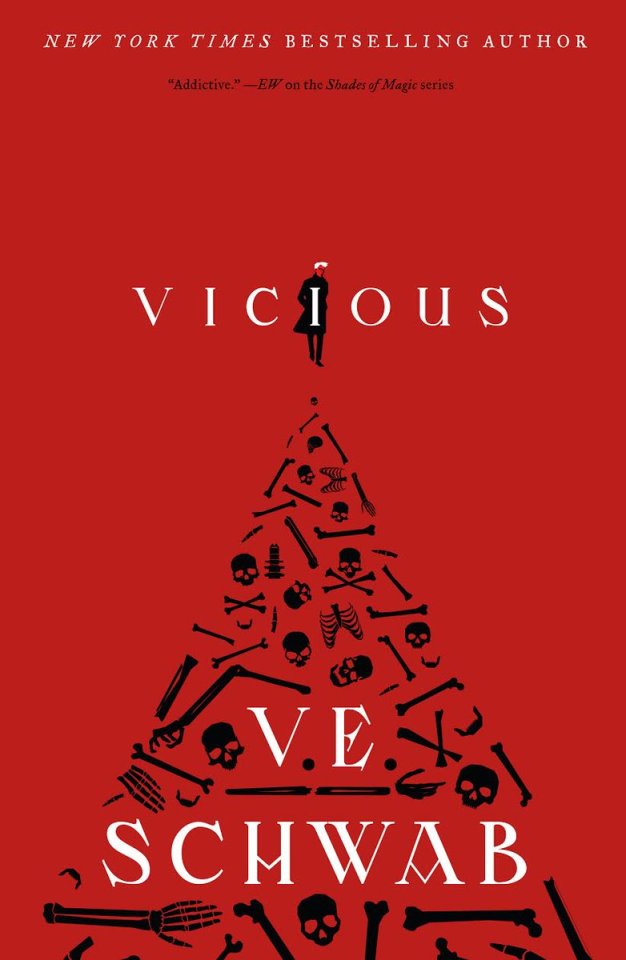
Victor and Eli started out as college roommates—brilliant, arrogant, lonely boys who recognized the same sharpness and ambition in each other. In their senior year, a shared research interest in adrenaline, near-death experiences, and seemingly supernatural events reveals an intriguing possibility: that under the right conditions, someone could develop extraordinary abilities. But when their thesis moves from the academic to the experimental, things go horribly wrong.
Ten years later, Victor breaks out of prison, determined to catch up to his old friend (now foe), aided by a young girl whose reserved nature obscures a stunning ability. Meanwhile, Eli is on a mission to eradicate every other super-powered person that he can find—aside from his sidekick, an enigmatic woman with an unbreakable will. Armed with terrible power on both sides, driven by the memory of betrayal and loss, the archnemeses have set a course for revenge—but who will be left alive at the end?
“Plenty of humans were monstrous, and plenty of monsters knew how to play at being human.”
When can I marry Victor and adopt the rest of his gang?
Seriously, I would do anything (ANYTHING!) for any of them, but I’ll come to that later.
Dark, twisted, vicious. This story reminded me all over again why I am such a sucker for hardcore anti-heroes. Victor and Eli are best friends and college roommates. Were. Before Eli shot Victor and sent him to jail after he killed his girlfriend. It is sure as hell more a little bit more complicated, but it started with Eli’s research on his class thesis about EO – the ExtraOrinary. Namely, those are people who endured trauma, more accurately near-death experience, and body’s chemical composition changed and gave them… powers. Naturally, what would two arrogant, rich, bored seniors do rather than experiment, on themselves? What could possibly go wrong?
World building in this book is by all means astonishing. As in Shades of Magic, Schwab provides a whole new perspective on superpowers. This mixture of science fiction and fantasy makes a perfect foundation for an extraordinary story. I especially like the concept of EO’s getting their powers – persons last thoughts are somehow connected to the source of their newfound power. Genius.
I have a sudden urge to write a poem about Schwab’s spectacular writing and pacing. This book is everything I didn’t even know I needed in my life. The whole book is, in fact, a big preparation for the epic encounter between Eli and Victor. The book begins with the opening of Eli and Victor’s story, how they got to where they are, ten years from the moment that changed their lives and where are they now. Then it slowly introduces backstories, development, motives and then it begins the process of including other characters who complete their story. I loved the way Schwab introduced her world and story, with all “10 years ago” “two weeks ago” chapters she created the rhythm of slowly unraveling the plot, and I could, indeed, feel the story piecing together like a puzzle.
Tension is everywhere, all over the city of Merit, and it keeps increasing, chapter by chapter, hour by hour until I almost lost it from lunatic anticipation. It is growing slowly, almost lazily, that I didn’t notice it at first, but towards the end, it was so much of it that I was all nerves. Even though I knew (suspected,,) Victor had a plan the whole time, I felt on edge the whole time and just waited for everything to go wrong. The plot was really dynamic and it is so worth reading because I couldn’t part with my kindle for the most of the time.
I really want to shout this aloud a few more times because I am afraid there is a person in some corner of the Earth that don't know it. Victoria Schwab has the absolute greatest characterization. Victoria Schwab died, was revived and received power to write the most shshiny, perfect, spectacular characters. That’s the only explanation for this perfection.
Victor Vale“Because you don't think I'm a bad person," he said. "And I don't want to prove you wrong.”
I knew I’d love a wonder that Victor Vale is from the moment he appeared on the pages. An introvert ambitious genius constantly overshadowed by his charming roommate. From early descriptions, I could see something that is going to be a big trigger for Victor – jealousy. He’s constantly envious of Eli, even though he does not know it. Whether of his ambition, knowledge, his girlfriend Angie or his ability to charm his way out of anything, he is constantly overshadowed by him. His chance to shine pops out during Eli’s research about EO’s – if they could do it and Victor became EO, wouldn’t that make Victor equally, or even more important for the research and force Eli to work together? Well, that is about to be good. His blind determination to become part of Eli’s research turns to obsession, and he isn’t willing to stop until he succeeds, no matter the cost. After a series of events, he ends up in jail for ten years. That is, like, “before” (before becoming EO) part of his character. I’m still missing out some of his backstory, but I hope Schwab will bless us with that in Vengeful.
“I want to believe that there's more. That we could be more. Hell, we could be heroes.”
The “after” part of Victor is insane. What can a guy do in prison for ten years? Well planning a vicious revenge sounds like a deserving source of entertainment. I love revenge and characters driven by it because it always makes things dirty. So, Victor breaks out of jail, with nothing on his mind but sweet sweet vengeance, no moral compass and ability to inflict or stop pain on anyone. The reason I said there is “before” and “after” of his character is that becoming EO changes people. It takes some basic but vital feelings, like grief, guilt, regret, empathy. He remembers what it’s like to feel those things, but can’t actually force himself to feel them, but has to constantly “remind” himself of it. He acknowledges something is wrong, because he set it like that in his mind, but he doesn’t sense it. (I had a quote but can’t find it, damn, but here’s one I found: “A pang of guilt, something foreign after a decade in jail, nudged his ribs.”). That I-don’t-care-but-care, ughgghghgg he’s so adorable, with a weak spot for twelve-year-old necromancer, old dog and his hacker cell mate. (“Victor fed it to him, and gave the dog’s ears—which came to his stomach, even sitting on the stool—a short scratch. He looked from the beast to Sydney. He really was collecting strays.”)
Mitch
Mitch aka chocolate milk is the most iconic character ever to exist. A kick-ass hacker, who constantly ends up in prison for crimes he didn’t commit. So one day, he loses it and decides to actually commit a crime, well, if he’s going to end up in jail anyway, better make it good. He’s actually the ultimate sweetheart and I love him.
Sydney
Sydney is also a EO, with a badass power – she can raise the dead. She grew up with manipulative older sister and parents who didn’t particularly care for her, so she isn’t to eager to go home after her sister and her psycho boyfriend try to kill her. I just have to say how much I love the three o them together. They are such a cute, badass little family and I love it so much how they grew on each other without knowing it.
“She knew exactly where she was going. Serena hadn’t told Sydney to go home. She hadn’t told her to run away. She’d told her to go somewhere safe. And over the course of the last week, safe had ceased to be a place for Sydney, and had become a person. Specifically, safe had become Victor.”
I’m melting inside.
Eli Cardale
“If Eli really was a hero, and Victor meant to stop him, did that make him a villain?"
Eli Cardale the ultimate villain, who believes himself a hero with a mission from God to purify the world and protect people from monsters that are Eos. I guess he forgot that he’s an EO himself, whoops.
“When no one understands, that's usually a good sign that you're wrong.”
But it’s all good if he feels blessed. I actually thought I’d like him for his dedication to the cause, but he just annoyed me all the time with his god complex.
Serena
Serena is a really good female villain – always gets everything her way and know exactly what she wants. She has real ambition and is a type of villain I usually like but she possesses a dose of bitchiness that made me hate her. *spoiler* I was so happy when Victor killed her, but I have a bad feeling about her and that they aren’t done with bitch-siren yet.
Now if you’ll excuse me I have to go and read the second book in one go, probably regretting it later because I’ll miss half of my life 😊

1 note
·
View note
Text
Voltron Season 4
A continuation of this! Because I can’t get these ideas out of my head, but I haven’t actually gotten around to writing any of it yet.
I wrote my version for season 3, so now I’ma just keep eventually going through all 6 seasons, lol. Which means we’re getting into my personal headcanon territory as well as original ideas, so read at your own risk (people who have read Serendipitous Fate know what we’re in for here).
SO ANYWAY! The team is all back together following season 3 and so we’ve got to change our direction a bit. The characters that got the most focus in season 3 were Hunk, Lance, and Keith, with a bit of Allura and Pidge on the side. So season four is going to revolve more generally around Shiro, Allura, and Pidge, with the other three doing things more subtlety in the background. What does this do? Well, mostly it allows for a way to address the issues between Keith and Lance without making them center stage. Hunk—following his development in season 3 and his want to keep the team together—will act as a kind of middle man as these two get their shit together in the background of the main narrative, as I think Hunk has mainly been only in Lance’s corner previously.
So, the season will open up following the battle with the Galra. Everyone is finally back together and with the stress of the situation no longer weighing on them, the actions they took last season will begin to trickle in. There will be implications that everyone is basically caught up on what everyone else was doing, so we don’t have to view that summary. Keith and Lance will, at some point early on, address the rift they created at the beginning of season 3 with apologies and the decision to try and listen/understand one another better. It will be kind of a sweet moment, but then be interrupted by Hunk or Pidge and it won’t last. Why? Because Keith and Lance, though they be trying, will still struggle to get along and so we can’t have the moment be too heavy. Lance is aware of his insecurities and that he projects those onto Keith, and Keith is aware that his tendency to go off on his own and make solo decisions tends to grate on the others. They both struggle to control these things however, and so still argue, but are making clear attempts to get along better. Hunk, now feeling more comfortable in his position as the rock and the one bringing others together, is less dependent on Lance for validation and making efforts to get to know Keith as well, which results in him making a good middle man between the two when they fight and a good voice of reason in pointing out the mistakes both are making. This is kind of their status quo throughout the whole season and we see in the background as they make slow steps toward better relations with one another, like gradual building blocks. This also makes a better opening for Keith to connect with them, as Hunk taking a more active role opens doors to Keith that weren’t there previously. It’s also important to note that, as a result of season 3, Keith is now also making better efforts to connect with the other paladins just generally.
So that’s the background story. Up front we have Shiro, Allura, and Pidge. Shiro has been trapped in the astral plane, basically, and as a result, was both kind of helpless as well as able to better recall all of what happened when he was captured. Not in the strictest sense, but more like the effects of the astral plane (which we will learn more about later) have made things more accessible to him. Which means Shiro is going to be suffering more heavily from PTSD with more frequent flashbacks to his time as a prisoner. Which is important because it will not only help us gleam more of his character, but of the Galra as a whole. As well as their technology and the effects if has.
During this beginning time, we’re also going to be getting hints of Allura learning more about her magical abilities and what that means/the connotations that come along with having the ability to use magic (there’s a lot of negative stigma). This was something that was kind of ignored in season 3 because, well, Allura was ignoring it, but because of some battle or rescue, it comes to the forefront and Allura has to confess that she has these abilities and that she basically doesn’t know how to use/manage them.
The driving plot point for the beginning of the season, however, will be Pidge and her father. Her father (his name is Sam I think?) explains that after Matt was injured by Shiro, he was sent to the same work camp and they were reunited. Gradually, rumors of Voltron came in and out with prisoners and Matt was able to, as a result of Shiro’s sacrifice for him, inspire a revolt within the work camp. They managed to escape and basically started a kind of underground resistance movement of their own, where they flew around to prison camps and started freeing others, mostly in attempts to find Shiro on Matt’s end.
Sam and Matt got separated at some point, however, and that was when Keith found Sam and brought him back to the Castle of Lions. The team, probably in episode 1, decides that locating and forming an alliance with this resistance movement, which Sam explains has become quite organized, is a good move to make. So they set their sights on that, which Pidge is grateful for because of her brother, obv. It’s in the following character building/filler eps that we get the Shiro flashbacks and the Allura magic issues, probably while they’re answering distress calls and learning more about the resistance.
Lotor is also causing problems. He’s abandoned his battle, which basically makes him a traitor, and so he can’t return to the Galra. Yet, for how much he hates his father and the Galra, he still wants to be a part of them (it’s his home, after all) and so we get a little bit of Zuko behavior in which Lotor basically harasses team Voltron every once in a while. This is also what leads to Allura’s magic outbreak, as Lotor is also a magic user and it’s him that somehow inspires her own magic (likely during battle) to show itself. In this way, Allura and Lotor become very clear foils for one another (more so than the obvious already makes them). Basically Lotor figures that if he can capture Voltron, he can regain his standing in the Galra empire and the luxuries that come with it.
So all these stories are kind of working together, unlike in my season 3 where everyone’s arc was very clearly divided (symbolism!). So we’re into episode 3 or 4 when they manage to come across some of this organized resistance that Sam spoke of. Matt’s not with them, but they raise some issues of their own in how they’re dealing with the situation. Maybe they’re trying to recuse some prisoners and are a little dramatic about how the sacrifice of a few to save many is worth it and Shiro and Allura have to kind of step in and be like, no, that’s not how this needs to work. Maybe Rolo and Nyma are there and it’s through them, because they’re more willing to listen to team Voltron, that they get through to the resistance that they need to correct how they’re doing things if they want to do things “right.” They end up saving everyone, of course, but both Pidge and Sam are uncomfortable with how the resistance seems to be functioning. Especially since Matt was supposed to be in charge (maybe there’s a nice Shiro comforting Pidge moment).
So we let that plot point lie for a little while and turn our focus back to Shiro. A lot of what inspired Matt to start the resistance was Shiro’s actions, and so The Champion has kind of become a beacon of hope/inspiration/hero to the resistance, thus making Shiro feel guilty for the relative mess it’s kind of become as a result of what is interpreted as his brutal actions. He also feels guilty over the fact that team Voltron fell apart while he was gone, so he’s just generally down on himself. He’s had more and more of his memories as The Champion coming back and he’s more and more displeased with what he’s finding out he did. Turns out he was actually pretty brutal in some respects, even if it was just to survive, and so some of what the resistance thinks of him is justified. Basically this episode will lead to Shiro being more introspective about what happened—as painful as that may be—which leads to considerations about his arm and its mysteries.
The Galra technology is something that takes the life force of other living things and turns it into fuel (sounds like FF7), so it’s logical to assume that Shiro’s arm, to a certain extent, is infused with this life force to function. As it turns out, it’s his arm that acts as the key to the astral plane and is what allows him to access it (what Hagger meant when she said he could have been the most powerful weapon she’d ever made). He probably finds this out during some kind of tense situation in which he disappears by accident and then reappears again.
Which leads to Allura and Coran explaining what, exactly, the astral plane is (probably in a following episode). Turns out it’s kind of like another dimension where quintessence shifts in and out with the death and creation of planets/life/etc. It’s also where magic is said to come from, as those who use magic have a link to the astral plane (which is kind of why it’s frowned upon). However, magic users can’t access the astral plane directly as Shiro can, which is why he’s so vital. It’s one thing for one’s “essence”—as Shiro and Zarkon had done in the past—to shift between realms, and quite another to be able to physically go there, as Shiro can do.
Allura determines that Shiro’s ability must have been a rare breakthrough for Haggar and is why he’s considered so dangerous. Someone with direct access to the astral plane could, logically, have unimaginable power. Good thing Shiro doesn’t want unimaginable power, unlike certain villains who are probably recovered following season 2’s finale.
In this way, however, Allura and Shiro’s stories begin to overlap a bit, though that fact won’t become totally clear till later seasons. Lotor comes back into the picture, probably, and ends up taking on Allura one on one or something. We learn some about their past together—how they probably grew up together or something and how Lotor turned evil alongside his father. He likely taunts Allura for her weakness, as they’re battling using magic and she’s at a clear disadvantage due to lack of training. And while I’m all for Allura being able to take care of herself, I do want Shiro to step in here and redirect Lotor’s power to the astral plane with his arm. Which likely shocks Lotor and sends him fleeing, again (until next time, hu hu hu, team rocket style).
Maybe we’ll get a heart to heart between Shiro and Allura at the end, where Allura expresses her sorrow at her abilities as well as her weakness in using them properly, and Shiro tells her something about how it’s not the power itself that is evil, but what she chooses to do with it, just as he’s turned his curse of an arm into something useful, or how Keith uses being Galra to their advantage. Which helps her put a more positive spin on her situation and shows that, as a result of using his arm for good, Shiro is dealing with his own issues.
Next episode (we’re probably into the later side of the season by this point), we’re back on focus with Pidge and Sam. But the Blade of Marmora is back as well and they’re pissed because the resistance isn’t tactful at all and they think they’re making things worse all around. Which puts some tension on Voltron as they do have alliances with both factions. It quickly begins to escalate, as Sam—despite having grievances with how the resistance is functioning—is willing to defend it, and so there’s some arguing to be had between him and Kolivan. The Castle of Lions is already headed to the resistance’s home base (it moves all the time, which is why Sam didn’t know where it was), and so they calm Kolivan a bit by promising to talk to the resistance leader about what’s happening. They think the leader is Matt.
Well, they’re wrong. When they get to the resistance’s base, they aren’t greeted warmly. They’re actually attacked and asked to leave. When hailed to speak with the group on the ship, it’s made clear by some alien dude (who’s apparently in charge) that they’re just fine without Voltron and could care less about the alliance made previously with the other chunk of resistance members. They’re convinced they can deal with Zarkon on their own. Sam makes it quite clear that a lot of members of the resistance don’t agree with this stance and that leadership appears to have been taken over by a group of extremists set on destroying as much of the Galra as possible without much consideration for how many lives they actually save. He probably knows the leader alian dude due to previous problems caused within the resistance or something.
So, obviously, this is not good. The resistance doesn’t want anything to do with Voltron and so it’s become dangerous to approach. But the base will be moving soon and Pidge doesn’t want to lose it, not so long as there’s a chance that her brother is aboard. Thus, we get Pidge sneaking out in order to then sneak aboard the base and search for her brother. She gets caught, however, by Keith, who quickly learns of her plan. It’s at this point that he makes it clear he’s going with her, so we get some Keith and Pidge bonding time. He probably explains that he understands why she has to do what she is—he did the same for Shiro in season 3—but that he learned from experience that going off alone isn’t the best option. Pidge agrees and they set out together in the green lion (because invisibility). They probably also share in some discourse about why Keith isn’t angry she’s more focused on her family than the big picture, and Keith admits that maybe they’re not as different as he initially claimed. Shiro is like a brother to him, like Matt is Pidge’s brother, and so he’s more sympathetic to her situation now that he’s basically done the same thing she’s aiming to do. He just doesn’t want her to make the same mistakes he did. It’s all very touching, blah, blah.
Anyway, they sneak into the base, there’s some tip-toeing around, and they eventually find Matt. He’s not exactly a prisoner, but he certainly doesn’t have the freedom he did when he was leading the resistance. He was basically booted from being leader because the extremists said he wasn’t acting decisively enough, as “The Champion” would have done. And while Matt admits that he wants to find Shiro, he’s not quite in line with what the new leadership has in mind for getting rid of the Galra and finding Shiro, who they basically want to be their leader once they find him. Pidge explains that Shiro is with them—that he’s a paladin of Voltron with her—and that he wouldn’t agree with what the resistance was doing either (which Matt obviously knows). Keith soon interrupts the reunion, explaining that if they’re going to get Matt aboard the Castle of Lions, they’d better leave soon.
Matt objects, however. He can’t leave because all his work and research is aboard the resistance base. He explains that he’s working on a project that will make it possible to intercept satellite waves all over the universe and broadcast messages, giving him a way to communicate with potential allies as well as warn ignorant planets (like Earth) about the threat of the Galra. He’s also planned to use it to find Shiro. And seeing as this is a pretty important project, Keith and Pidge ultimately end up leaving without him, much to Pidge’s distress. She’s afraid that if her brother stays, he’ll eventually be put in danger by the extremists. And so she and Keith sneak into a control room where she downloads all the resistance intel before they escape back onto the Green lion.
Shiro is not pleased once he finds out what they’ve done, but the intel does prove valuable. Not only does it further illuminate just how much the extremists worship Shiro (much to his discomfort), but it also reveals a plan within which the resistance plans to rally their forces and take their base directly to Zarkon in a move that is both deadly and direct, just as “The Champion would do.” Clearly, team Voltron knows this is a suicide mission—the resistance has no idea what they’re up against and aren’t nearly big enough to take on Zarkon alone. Many lives that could otherwise be useful will be lost to a leader that is too disillusioned by power to know what he’s doing.
Which means it’s time to Voltron to step in, which the Blade of Marmora is more than happy about. Upon Voltron approaching the resistance base, however, they’re attacked (as expected). They have the aid of the Blade of Marmora, however, who agreed to sneak into the base and capture the leader while Voltron provided a distraction. Naturally, however, things don’t go as planned and Voltron, the Castle of Lions, and the Blade of Marmora end up in an all-out firefight with the Resistance.
And things only go from bad to worse when, lo and behold, Lotor shows up too. There’s a reason he knew where they were, I just haven’t thought about it yet. Anyway, he shows up and sets his sights on getting to Allura, who he views as Voltron’s biggest weakness—put her in danger and Voltron comes running. It’s important to note that he and his magic have been bothering the team for the past two seasons, so he’s a pretty dangerous/annoying threat.
So everyone’s focus is scattered, things look shitty, Lotor is being a dick. Maybe this is a three episode finale or something, or maybe only two. Either way, this ep ends with everything in disarray, Lotor probably aboard the Castle of Lions, and at the very last minute, a giant Galra force shows up (probably Lotor gave them a clue or something). Things only go from bad to worse.
Final episode. Voltron has been separated. Keith is with Pidge aboard the resistance’s ship looking for Matt. Lance and Hunk are on the battlefield. And because it’s the season finale and everyone deserves their moment, we get to really see why Hunk and Lance work so well together. Lance uses what he learned in season three to inspire the resistance—maybe against their leader’s orders—to side with Voltron and the Blade of Marmora against the Galra (who are attacking by now), while Hunk—being an awesome lieutenant—keeps it all together and organized. They’re the ones that kind of deal with the battle.
Shiro has gone back to the Castle of Lions upon learning from Coran that Lotor is aboard. We’ve seen by now that Lotor and Allura are facing off again, but know that Allura can’t really compete. Shiro knows this as well and also knows he’s the only one that can stop Lotor. Which is why he’s going back. There might be a bit of time where he notes that Lance is doing well at being in charge while he’s gone, or maybe it was at Lance’s encouragement that he go back to help Allura in the first place. But it’s a very small piece of development.
Meanwhile, Pidge and Keith are still aboard the resistance’s ship. They meet up with the Blade members who were there and make a plan. Basically Pidge goes alone to find Matt while Keith goes with the other Blade members to find the leader. Pidge finds Matt, but he still refuses to leave, even at the threat of the ship being potentially destroyed. Which infuriates Pidge and they get into an argument in which Matt accuses her of not seeing the big picture. The argument escalates, Pidge makes it clear to Matt just how much she does understand/how much she’s grown. He’s surprised and we get a more blatant reference to all the development Pidge has had. Matt agrees to go with her, despite how unfortunate it is that he has to leave his research, and they make an epic escape in which Pidge does some awesome, smart, impressive things.
Keith, meanwhile, is fighting through the ship with the few blade members to the leader. They get there, but it proves challenging. The leader alien is no one to take lightly and Keith eventually ends up in a desperate situation (after a sick display of his combat prowess, of course). Which when, out of nowhere, a kind of wormhole/portal opens up and out comes the Galra Keith saved inside the weblum in season 2. It’s also the same teacher type that Lance met during season 3, but only the viewers know this, not the characters. The mentor didn’t come with Lance to save the Castle of Lions in season 3, because reasons, and so no one but Lance knows them, which is why this miscommunication works.
They basically come in and disarm (kill? Or is that too much?) the leader, saving Keith. There’s an important moment where Keith loudly questions the person, wanting to know who they are, but they’re still masked and refuse to answer. Instead, they both get distracted with what’s going on outside the ship’s windshield. Namely, with Lance, Hunk, and the Castle of Lions.
Hunk and Lance are still out fighting, leading the charge against the Galra, but something happens and both Hunk and Lance know that the castle—which is too busy with Lotor to be focused on the battle—is in danger. So they head in to protect it.
Aboard the Castle of Lions, Shiro has reached Allura and Lotor, probably in the control room. Coran has probably been injured/disabled. Sam too maybe. Allura and Lotor are struggling against one another’s magic. There’s lighting, it’s intense. Shiro tries to step in the same way he had before, but Lotor is ready for him this time and manages to keep him at bay/blast him back/injure him before he can intercept the magic and divert it to the astral plane.
Allura is on her own and, while she’s doing a good job of staying on her feet and fighting back, it’s clearly inevitable that she’ll go down. There’s probably some words shared between her and Lotor that make her look like a boss going down, as she should. Shiro, meanwhile, is struggling to crawl back toward the fray. He can’t really get to Lotor, but he gets to Allura. Just as she’s about to go down, he touches her—maybe he gets to his feet and manages to place his robot arm on her shoulder or arm.
Which is when things get interesting. Together—with Allura’s power and Shiro’s ability to access the astral plane—they become a sort of unstoppable force of power. There’s a very impressive display of Allura’s power, maybe some glowiness, and Lotor basically doesn’t stand a chance against her with Shiro’s support. In fact, Lotor tries to escape, but Allura’s power overwhelms him and keeps him prisoner. All the magic is sucked right out of him and he ends up passing out right there in the castle.
Both Shiro and Allura are weakened by the exchange as well, but they don’t have time to be thinking about it, as things outside the castle have gotten worse. Maybe the castle jolts to the side or something and they look out to see that the yellow lion has just pushed them out of the way of a tractor beam (after all, the black lion was seen going into the Castle of Lions, so why not take the whole thing?). Lance is trying to distract the main ship, while the Blade of Marmora and the resistance beat back the Galra forces.
Keith is still watching from the resistance ship, as the timeline makes it so it’s only been moments since the leader was disarmed.
Pidge and Matt are in the green lion, headed in to help, but they’re too far away to do much.
Lance, in his efforts to distract the main ship, gets caught in the tractor beam intended for the Castle of Lions. Hunk, who’s the closest lion, tries to get to him, but he’s too slow. In Lance’s attempts to protect the Castle of Lions, he’s kidnapped by the Galra, who know they’re losing. Basically, the commander has settled for one lion and manages to escape as soon as Lance is on board.
We’re left floating in the silence of space, all the members of Voltron shocked and horrified to realize what’s happened. Especially Shiro, who gets the last scene. He knows what’s in store for those captured by the Galra, after all, and his fear and horror is the last thing seen before credits role.

#me stuff#voltron#season 4#voltron legendary defender#vld#fanfic idea#i guess#shiro#allura#pidge#hunk#keith#lance
262 notes
·
View notes
Text
Action/Adventure Writing: Capture
So, many months ago I said that in a few weeks I'd be putting up this post. Yeah. Not sure what happened to my scheduling there, since I do have an ideal order in which these things get finished and posted. I guess that, as the tagline says, I'm easily distracted.
With this post, we start getting into the meat of what really inspired this series in the first place; as I said at the beginning, it was driven by the fact that one of my pet peeves is crappy rescue scenes. Well, for there to be a rescue, someone has to get captured.
I thought long and hard about how to structure this one, because everything runs into everything else. Inevitably, therefore, this is going to end up being rather freeform. However, there is one thing to which I would like to give pride of place: motive.
As when writing combat, it's vitally important to determine the motives of those involved in the scene; just as in combat, there are risks involved for both characters, so they need to be motivated to take the actions you want them to take.
Now, unlike in combat the motivations are asymmetrical; the captor is the one driving the action. Why is she doing this? What's her interest in the person she wants to capture? Why is she taking him prisoner rather than killing him or letting him go free? Of those three options, taking a prisoner is likely to be the most risky and logistically difficult, so she needs to be motivated to do that rather than anything else.
In the case of the person being captured, it's a fair assumption that he doesn't want to be captured and that's his main motivation in the scene. However, how strong is that motivation? How hard is he likely to fight back?
First, you need to know why is this happening at all. Why does the captor initiate this whole interaction? There needs to be a reason right off the bat even before we can start discussing how strongly motivated she is and what actions she might take as a result.
Even after that, the strength of each character's motivation is going to be absolutely situation-specific, depending on, among other things:
Knowledge the characters have of one another;
Resources available to them, in terms of equipment, ability, escape routes, etc.;
Involvement of other characters, on either side;
If the captive knows that the captor won't harm him and he doesn't have a lot of options for escape, he's significantly less likely to put up a fight. On the other hand, if he knows there's some horrible fate in store for him if he's captured, he might at least attempt to fight to the death and the captor will need to be strongly motivated to put in the effort to take him alive.
As you can see, motivations interact a lot - a strongly-motivated captive needs a strongly-motivated captor in order for the scene to work. Likewise, if you want the scene to be big and impressive, you probably need a strongly-motivated captive in order to put up a fight against your strongly-motivated captor. A weak motivation on one side against a strong motivation on the other is going to result in a much shorter scene - either the strongly-motivated captive escapes (or is killed, depending on how the motivations of the captor run), or the weakly-motivated captive surrenders without much of a fight.
Finally, because motivation is situation-specific, it can change. For example, the captive might be strongly motivated to seek escape until he realises that a particular escape route isn't open to him, or a captor might not be motivated to put in the effort of capturing the captive rather than killing him until she realises who he is.
It's always my drumbeat with things like this: motivation. The more risky and difficult the action you want your character to take is, the more strongly-motivated he or she needs to be to take it.
Incidentally, this is getting silly. In reference to my NaNo from a couple of years ago, the captor's name is Thaurian and the captive's is Erain. She's a woman and he's a man in order to subvert the old cliche of the moustache-twirling villain tying an innocent maiden to the railroad tracks.
Anyway, I've talked about situation, and part of that is setting. By that I mean not only the setting of the story (fantasy, sci-fi, contemporary, historical, one country or another, and so on and so forth) but the actual location in which a scene or sequence takes place. Once again, I have to hark back to my combat post - I mentioned there that the setting can be important because of the resources it provides, and in this case it's also worth bearing in mind the possible presence of other people.
My first thought was people who might come in on Erain's side to protect him. However, depending on the situation and the attitudes of any onlookers, they might just as easily come in on Thaurian's side, or remain neutral. Say, for example, she's a police officer arresting a suspect - depending on myriad things about your setting and the situation, the reactions of any onlookers could go any way.
Furthermore, I mentioned earlier that this can be a sequence and not just a scene. That's because there may be multiple scenes and hence multiple locations in play - presumably, Thaurian is taking Erain prisoner and plans to take him somewhere to be imprisoned. Not necessarily, but in the majority of cases. That's also a location to be borne in mind, if only in terms of the resources Thaurian might have there and which she will need in order to take him there.
Resources are the final piece of the puzzle that you need to know about early on. And, again, I'm going to have to stay really vague because this can vary so much.
I am sorry for that, by the way; this whole post feels like it's been really empty of substance, but there's not much to say except a list of things to pay attention to.
Anyway, I've already mentioned resources in several places, and mostly what matters is the resources available to Thaurian, especially in terms of:
Help
Restraints and methods of imprisonment
Leverage
Leverage, in this context, means anything Thaurian can use to reduce Erain's motivation to escape. For example, if she has a hostage. Restraints and methods of imprisonment means anything she can use to make it physically harder for him to escape while and after actually capturing him. These can be things she brought with her or things she finds in the setting, depending on how much planning she's done.
Erain also has resources available to him (or not):
Help
Means of resistance
An escape route
Means of resistance can mean weapons or abilities or just anything Erain has that will help him.
Naturally, the fewer resources a character has - and, more pertinently, the greater the disparity - the stronger their motivation needs to be. If Erain's alone, unarmed, and cornered, he's going to need a good reason not to surrender, whether that comes from his knowledge of what might be in store for him if he's captured, determination to remain free for another reason, or anything else. Likewise, if it's just Thaurian to do this job and all she can really do is grab Erain and hold onto him, she's going to need a reason to do that.
And, the final piece which will be dependent on the characters, their motives, their setting, and their resources, all mixed up in what you actually want to do with the scene: what happens?
Of course, this is where even trying to provide case studies would get hideously complicated, so I'll just split into two types: violent and non-violent.
See, I've been acting this whole time as if there's going to be a fight. But it is the case that there might not be: Thaurian walks up behind Erain at a bar, puts a gun to his back and tells him to come with her, for example. In this case there's likely to be a much shorter scene, but depending on the situation and the characters it might make the most sense. Alternatively, you might have something much more violent whereby she ends up having to beat him into submission and drag him off in chains.
Of course, the situation might require one or the other, whether because of resources available, setting, and/or Erain's motivations and resulting actions. Thaurian might prefer one or the other. But before starting in on a fight scene for a capture scene, bear in mind that that might actually not make the most sense.
So that was a whistle-stop tour through my thoughts on capture scenes; I hope they've at least sparked some thoughts! I apologise for the lack of structure and detail, but, well, as you can see, everything is intertwined.
Next time, captivity. Hopefully that'll have slightly more structure.
5 notes
·
View notes
Text
Styles of Acting - What Defines the Differences?
When we speak of style, we are generally referring to the genre of the presentation, e.g., drama, comedy, suspense, tragedy, etc. For the style of acting normally follows the genre of the play: drama being portrayed in a dramatic style, comedy in a comedic style, etc. Style is also called the acting key, dramatic key, or sometimes the mood or tone.
The choice of style is an important one, as it is the culmination of many other dramatic choices. Without a consistent acting style, the portrayal may confuse the audience and create uncertainty about how they respond. It is thus a critical part the actor's craft, knowing how to perform in a number of acting styles. Kids Act LA is here when it comes to learn acting especially for kids.
Let's begin by defining style. Style is the selection and arrangement of acting elements and qualities to portray the dramatic truth, the purpose of the play. For the acting ensemble, it is the full realization of the characters' convictions. In other words, saying what we want to say just the way we want to say it.
Therefore, style is truth. It is the means used to express the crux, the essence, and the purpose of the play. It is the selection and arrangement of acting elements. At this point, let us discuss briefly the various elements that make up acting styles.
REALITY. Each style has a degree and kind of life-likeness that we preconceive by reading or viewing the play. The degree of reality can range from the realistic, naturalistic, to surrealistic (dreamlike) or fantasy, to the absurd.
As a general principle, reality is more lifelike in the dramatic styles such as drama, suspense, and tragedy, where as in the comedic styles such as straight comedy and farce, it is distorted and exaggerated. Likewise, the balance and proportion of story elements (setting, plot, dialogue, and characterizations) are more logical and believable in the dramatic styles and lack the same when moving towards the comedic styles.
Reality, the level of suspended believability, will range from the credible in dramatic styles to distorted, unbalanced, and disproportioned in the comedic styles. For the actor, the level of reality, as with all elements of style, must be an ensemble effort. As such, all the characters must exist in the same dramatic world.
THE DOMINANT DRAMATIC FLOW. The audience perceives each presentation through two communicative entities. One is the information of the play. What we see and hear. The dialogue, action, plot, and setting make up the literal, physical elements. The elements we observe, comprehend, and resolve with little cerebral effort or involvement.
A dominant dramatic flow that is informational involves limited intellectual processing and is mostly concerned with the obvious surface characteristics of the play. Because the information is mainly words, action, and stage business, it is pointalistic and primarily one-dimensional in flow. What we see is what we get; and we get one point at a time. Thus, the tempo can and should be quick for little time is required for comprehension.
The other type of dramatic flow is the emotional. This is the implied or inferred element of the presentation, and places importance on meanings, motivations, and expectations resulting from the action. Here the audience is involved with the emotions, rooting interests, and the wants/oppositions - hero/villain polarizations. Imagery, strong caring forces, multi-layered story and character complexities require considerable audience effort and emotional involvement.
A dominate dramatic flow which is emotional is, for the audience, a more reflective, questioning, decision-making process. While the informational flow displays information, the emotional flow demands a response, a judgment. It requires resolving complex data into a one-dimensional answer such as for/against, caring/hating, friend or foe. This process requires time and as such, the pace is slower. This way, the audience has an opportunity to focus on the underlying emotional forces as well as time to digest and resolve a much more complex presentation.
TEMPO OR PACE. Tempo or pace is the rate at which interesting story materials are delivered to the audience. Do not look on dialogue as the only factor affecting pace. Action, movement, gestures, and technical aspects (cuts, lights, and sounds) can likewise have a telling affect on the pace of a scene. Music is another dimension affecting pace.
TIMING. Timing is the ability to sense what is going on in the mind of the audience. It is the ability to use the dimension of time to encourage and enhance the desired response. Let me give you a few examples. In the setup of a joke, the pace at which one expends information is a dimension of timing. In addition, by separating the punch line or resolution from the setup, it can create the desired emphasis, suspense, and/or anticipation. Following the punch line, it is holding for peak laughter and knowing when to continue with the scene. In drama, it is how long one sustains a dramatic point so it is understood and felt to the maximum. In terror, it is that period of time the audience has to speculate the outcome and to be affected by the potential of terror (pain).
EMOTIONS, INTENTIONS, AND BEHAVIOR are the most basic selections in acting. The natures of these choices likewise relate to the genre of the play and to its style of acting. As with the other style considerations we've discussed, the inter-relationships between acting elements provides helpful dramatic guidelines.
Emotions are very large consuming forces. They have an active power to cause drastic change and action. These emotions emerge from the character's commitment, the obstacles, the situation, and the world in which the story is set. In the world of comedy, the emotions are light, decisive, and played on the surface so as not to encumber the quick-moving informational content. Emotions in drama, more so than anything else, move the story forward. Thus, the emotions have a wider span, deeply played, and range from full passion to concealment. As you can see, how one expresses and presents these emotional forces determines, in part, the style of acting.
The intention (sometimes called the objective, thought, or motive) is what the character wants. This conscious intent should be rich, simple expression formulated in active terms that, along with the emotion, produces the perceptible behavior.
This behavior, when open, precise, and readable, requires little effort to comprehend. Such behavior is found, more so, in the comedic styles where the intellect predominates.
On the other hand, it can be subtle, subdued, or even ambiguous, to the point where the audience must search for meaning. This behavior we find in the dramatic styles where strong emotional forces prevail.
PREMISE or THEME. Yet there is a common ground. There is a purpose in each play, a reason for its existence. Almost all plays communicate something, something of worth. Most of the time, this importance and excitement have a profound and predictable affect on us. There are plays with strong social and humanitarian implications while others relate to the pursuit of the ridiculous.
In drama, the premise is highly worthy and has strong rapport with the audience. Powerful opposing forces (polarities) make for empathic characters. The writing is serious and intelligent having compelling arguments. The high moral implications give substance and purpose to the story. Human dilemmas are reflected through vital decisions and their consequences.
AUDIENCE RESPONSE. Identifying this response is a major concern for the creative team, for only then can the director, writer, actors, and the production crew collectively arrange and select the elements and qualities to encourage this vision. This process is a group effort and its determination does not always come easy. It often requires considerable probing of the material through readings and rehearsals along with a spirit of collaboration and open communications.
There is one last critical aspect we should cover namely that of being consistent and faithful to the selected style. If you are doing a mystery with comedic scenes, then they must be done in the style of mystery. This does not mean a tragedy must be all sadness or a comedy all laughs. The style of acting, however derived, must be consistent to the genre of the play. That means serving the purpose of the play and maintaining focus on the overall desired audience response.
Kids Act LA Acting School is playing an important role of mentors in the lives of children who are looking forward to learn acting and other performing arts. The institute has a strong guidance system that could provide complete support and guidance to the prospect performers.
Kids Act LA offers courses designed to teach children the skills needed to get an edge in the entertainment industry. Our mission and ultimate goal is to allow for our children to achieve personal growth and empower them towards substantial achievements in the film TV and commercial industry.
Call us 949 273 8804 for free consultation today!
Or visit here: http://www.kidsactla.com/
0 notes